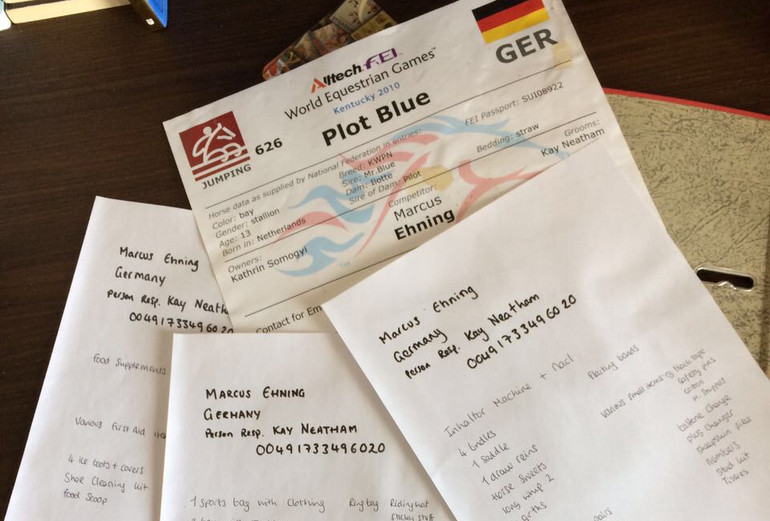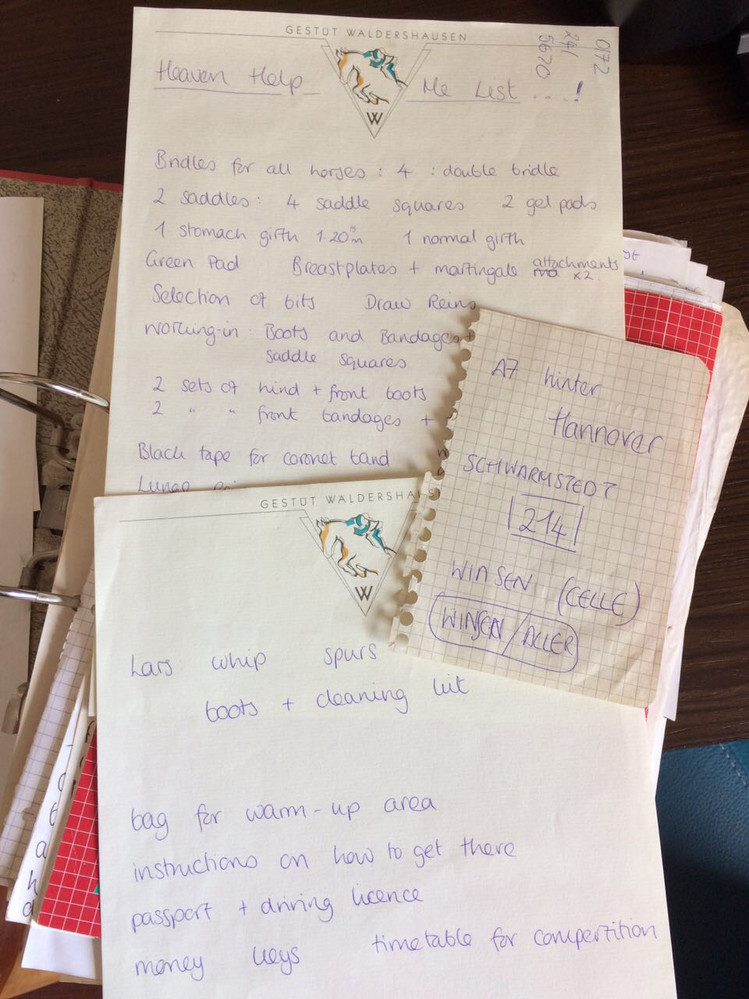Marcus Ehning's head groom Kay Neatham gives us all a good lesson on how NOT to have to ask heaven for help when travelling to a show, while at a show or going home from a show. "Write lists and think before you just throw everything in the truck, have the discipline to work methodically, it will save you hours and give you brain space for more important things than hoof picks," Kay writes in the fourth part of our series 'Groom Guidance'.
I was 14 when I started working in the school holidays for a family whose daughter rode dressage at young rider level. They had four beautiful horses, and they taught me a lot which gave me the foundations for the job I have never stopped doing since – grooming.
Many things have stuck with me through the years especially something the mother taught me the first time I helped her pack for a show. “Heaven help me if I forget any of this…”, it’s the line she wrote at the top of her list for packing… Every list I have written since starts like that.
Being organized is a groom’s middle name, and it is impossible to think you can keep everything in your head. Writing lists is the key to success, plus many other things and a huge amount of self discipline.
As I start packing for a show I am the type of person who works on visual, I open a trunk and can see something is not right because there is a gap where usually the saddle soap stands or the tub of plaiting bands. As I notice something is missing I always have a note book with me, I write the name of the show at the top of the page and then write what still needs to be packed as I find things missing or remember something my rider has asked me to pack extra that week. For the horses I always visualise them walking down to the ring, I can see what tack, what boots, fly hats etc. each is wearing. Then I imagine the type of class i.e. For a Nations Cup I could see the horror of Marcus riding to the ring in a Nolte jacket for Germany, and everyone pointing at me because I’d forgotten his red team jacket. I would be needing more than heavens help if that had happened! I often packed as the day went along so I could be in the middle of packing boots and someone would come and ask ‘can you just look at this?’, or the paddocks would need changing or the truck moving or someone would call… It’s so easy to lose track of where one was at and by writing it down meant I don’t have to ask too often for ‘heavens help’.
By having a note book or a board, or using my reminders on the telephone, it helped me to have a clear mind. Imagine how much space I'd need in my brain in order to remember everything that needs packing for me, rider and horses – oh not forgetting my dog. I personally would probably drive off without the horses because I was still connected to remembering everything I might have forgotten to pack. pack. You see now I’m even writing double!
Another important thing to think about when packing is the fact that you need to carry it all to the stabling, which can be miles away, through terrible terrain, knee deep in mud or deep gravel. Ever seen or been the poor person whose trunk gets stuck, loses its balance and then topples over? It’s a nightmare. Look at your packing and ask yourself how many times will I need to walk back and forth to the truck to get everything to the stable area, do I have too many loose items, is that trunk to heavy for me alone? This can save hours of time, if like me you imagine yourself arriving at the show, you are alone, have no help from heaven and don’t want to be lugging stuff backwards and forwards all night – you’ll quickly learn to pack more efficiently and in a way you can manage alone.
Once I start packing everything into the truck I try to think about what I’ll need first. Generally, that would be tools to put down beds in the boxes, a trolley to get shavings or straw with, then maybe water buckets. These need to be packed last, so I can easily get to them first. If you have a groom’s door to the horses that will need checking while your travelling, leave plenty of space so you have easy and quick access, especially if something goes wrong and you need to get to the horses fast. There’s nothing worse than climbing, squeezing and probably swearing at things in your way if better packing would easily have made your life easier. When staying overnight on the way to a show, pack what you will need for that, food, water buckets, extra blankets, where you can access it all, without having to unload the whole truck. Who wants all that effort of searching for things when you’ve had a long drive?
The down side of winning the Grand Prix on the last day is generally you’re last to leave the show ground, or I was often anyway, very glad it was often otherwise we weren’t winning – but back to the point I wanted to make, last means alone. So if you’re trunks don’t get on the truck with just you packing, without you having to panic about finding people to help, your either not getting home, leaving the trunk there (not a real option) or killing yourself and climbing into the truck thinking 'my knee, I shouldn’t have done that…' I always packed in a way I could manage everything by myself and everything had a place. There is no point throwing everything in the truck feeling like you’ve left quickly, to then at home need to take everything out and it’s a crazy mess. You might have a 12 hour turn around and not having the discipline to pack the truck correctly to come home, means hours of extra work and less sleep time.
In the good old days I didn’t have a phone or a GPS, so before leaving home I would study the map and make sure I knew exactly in which direction I was heading. Work out from the scales on the map for about how far, 100 km, 200 km on that highway, etc. This I would also write down, a college gave me a great tip as I first started driving alone to shows: Make a note of all the major highway crossroads, which highway number and major city direction I would be heading and cello-tape it to the steering wheel, that way she explained I wouldn’t need to be fiddling with the map in the middle of the night or heavy traffic so I did this for years. I don’t do that any more, and I love the navi but it’s terribly sad when I speak to people and say ‘did you come down the A1?’ and they look at me blankly and say ‘where?’ Its pretty ignorant to rely entirely on a navi, and not even know if one is travelling north or south or which major city one is passing or which highway one is on. A lot of people don’t even have a map in the truck. If I called my boss and said ‘hey I’m stuck, the truck broke down’ – the first question might be ‘where are you?’ How stupid would I look if I said 'I don’t know, the navi stopped working too!' What next? Jump out, flag down a car and ask ‘where am I?’ Of course these would be extreme cases, but highly embarrassing ones and terribly irresponsible to the horses standing in the truck relying on us to get them to the show as safely and as soon as possible which is better achieved when one knows where one is going without electronic devices.
I was recently reminded how important it is to have a stable book either in the form of a diary, a folder with a page for each horses in it, or a computer system – like barn manager.com – which I was first introduced to while in Florida. It's made by some great people and owned by Nicole Lankin, they've been on the inside so really know what service to offer. It is again impossible to remember the exact date of the last worming, of shoeing, when a horse had a swollen leg or a rash, but it is very important to be able to look back and check these things. Imagine thinking a horse had colic about three weeks ago, everyone’s feeling of time can be different, he got medication from the vet for that, which was let’s say 21 days doping – can he go to a show this week? I think so it must be about three weeks ago, that’s a big IF when doping rules are tight and you never know when the horses will be tested. So much better to be able to check the book and know for sure. Another good reason for keeping a stable book is to compare your bills. In a big stable it’s easy to get a bill and wonder why that was so expensive or it seems like too many horses for the physio… It’s also very easy for a busy company to make a mistake when there accountants sending invoices, but with your own stable book it’s easy to double check invoices.
Writing lists is for me a massive part of being a good groom, it is impossible not to sometimes forget things – but it is possible to not to have to rely on heaven for help if it doesn’t work out well. Never forget if someone asks to borrow something from you at a show because they forgot it, if you can help then help, because next time it might be you. Generally, between all of us at the shows we have everything needed. When maybe a rider has a change of plan or a horse is off his food or your black tape just ran out – I’ve said this before once and I’ll say it again: Sharing is caring. I think asking heaven for help is actually my neighbour saving my ass, but by writing packing lists I won’t need to ask too often.
Write lists and think before you just throw everything in the truck, have the discipline to work methodically, it will save you hours and give you brain space for more important things than hoof picks.
-Kat Neatham-










